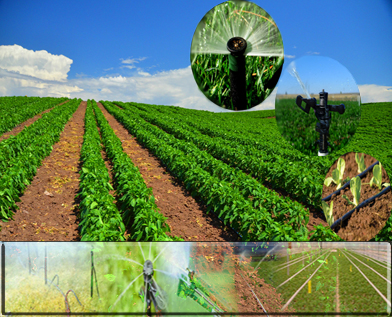Improving water-use
efficiency
By
MOHIUDDIN AAZIM
 Provincial
governments of Sindh and Punjab are trying to economise
water use in farms by promoting sprinkler and drip
irrigation systems. Provincial
governments of Sindh and Punjab are trying to economise
water use in farms by promoting sprinkler and drip
irrigation systems.
The objective is to boost agricultural productivity
by checking wastage without compromising on the actual
water needs of plants, farms and orchards.
The Punjab Government shares 60pc of the cost of
installation of drip irrigation systems, while the Sindh
Government is offering an even higher subsidy of 80pc.
Both the governments are also trying to attract local
and foreign investment in manufacturing of sprinklers
and drip irrigation systems.
But small growers say officials of irrigation
departments do not respond to their queries about these
schemes that have so far benefited only a handful of big
landlords.
“Only lately we’ve launched a media campaign
encouraging farmers to keep in touch with local offices
of relevant departments for availing of drip irrigation
scheme or the likes of it,” says an official of Punjab’s
Agriculture Department without elaborating on the scheme
itself.
He says that the provincial government has been
supplying drip irrigation systems for some time to
farmers in Potohar region for improved cultivation of
grapes and olive, adding that lately the scheme has also
been extended to Multan.
It could not be learnt, however, how many subsidised
drip irrigation systems have so far been supplied to
farmers.
Officials of the Sindh Government say that in the last
fiscal year, the provincial government had installed
subsidised sprinkler systems on 2,590 acres of land;
drip irrigation systems on 1,025 acres and Rain Guns on
2,296 acres.
Industry sources say about three dozen companies are
currently marketing around 50 local and imported tools
and mechanised systems for efficient water use.
Some of them are also exporting them. Big farmers have
long been using these products including farm water
sprinklers and drip irrigation systems on their own. But
now the provincial governments want to make their use
more common.
“This drive has two components. Number one is to
incentivise the use of these products and number two is
to attract investment into their local manufacturing,”
explains a senior official of Sindh Irrigation
department.
Officials of the Sindh Government say that a
comprehensive survey conducted in 2012-13 had
established the need for not only price subsidies but
also making capital grants to promote manufacturing and
use of drip irrigation systems.
Officials in provincial agriculture department say more
than half of the cultivated land in the province (about
three million hectares out of 5.5 million hectares) does
not get enough water for various reasons. Water
sprinklers and drip irrigation along with rain water
harvesting in such areas can prevent farm productivity
from falling due to water shortages.
An official of Balochistan Agriculture Department told
Dawn over phone that about 10 years ago about 100 drip
irrigation systems were installed in various parts of
the province with the financial support of international
agencies including ADB but most of them failed to
achieve the desired results.
The reasons for failure were many including lack of
knowledge about irrigation scheduling and high cost of
electricity.
He said the provincial government is interested in
reinvigorating not only the dysfunctional drip
irrigation systems but also in installing new ones and
has been in touch with international and local companies
for this purpose. He gave no further details.
A recently released study of the International Food
Policy Research Institute lists drip irrigation,
sprinkler irrigation and water harvesting among those
practices and technologies that can help boost
agricultural productivity by up to 67pc.
Crop protection, drought and heat tolerance, integrated
soil fertility management, no-till farming, nutrient use
efficiency, and organic and precision agriculture among
major technologies and practices that can boost farm
productivity.
Officials of National Food Security and Research say
they have identified a number of countries from where
technical help and private investment can be sought in
making drip irrigation technology more popular in
Pakistan.
These include Cyprus, Jordan, France, South Africa, the
US and UAE. The private sector companies of these
countries can also make investment in our drip
irrigation systems if we can offer them a suitable
environment.
Environmental changes affecting water availability,
growing population, food security and exports have
increased the need for most prudent use of water.
Sprinkler and drip irrigation systems effectively use 30
- 50pc less water than in the most common furrow
irrigation without affecting the crop growing needs.
Some farmers say that Rain Gun irrigation system or
overhead sprinkler irrigation system is gaining
popularity among farmers because in addition to
economising the use of water it saves labour cost in
cases where grain fields are periodically watered with
the use of permanently installed riser stands.
Sindh-based Jaffer Agro Services is one of the leading
local companies that has been involved in manufacturing
of sprinkler, rain gun and drip irrigation systems in
technical collaboration with India and the US.
Courtesy:
The DAWN
|